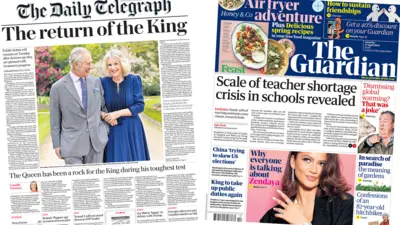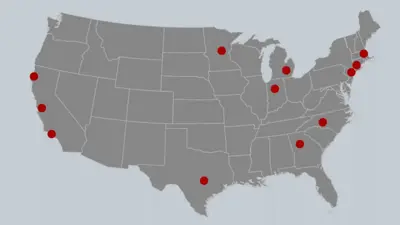We've updated our Privacy and Cookies Policy
We've made some important changes to our Privacy and Cookies Policy and we want you to know what this means for you and your data.
Why taking up an instrument has struck a chord for so many
- By Suzanne Bearne
- Business reporter
Image source, Getty Images
Growing up in foster homes, Jaz Ampaw-Farr says learning a musical instrument seemed out of reach for someone from her background.
"I grew up in real poverty, working class, and mixed race; music lessons were never a thing," she says. "Every person I saw playing an instrument was white and mostly male."
However, when the coronavirus lockdown happened, Ms Ampaw-Farr wanted to change that tune.
"I thought, it's happening, it's time to reframe that story and seize the opportunity," says the 50-year-old. "I had no events or work to do. In that moment I saw an unique opportunity to focus on me."
So Ms Ampaw-Farr, a motivational speaker and boss of UK support coach firm, Human First, downloaded a piano-learning app, and bought a keyboard.
She then started to try to pick up songs from artists such as John Lennon, Ed Sheeran and Lewis Capaldi.
"I started playing songs I knew, and other people would say that sounds nice. It made me feel good."
Image source, Jaz Ampaw-Far
She says she would typically practice for at least 10 minutes a day. "Sometimes it was longer, sometimes I'd miss a day. But it's amazing how quickly you can progress."
As the pandemic gave many of us a lot more spare time at home, Ms Ampaw-Farr is far from alone in taking-up a hobby since March 2020, a number of studies have shown.
One report by research firm Mintel found that 71% of UK adults were spending more time on a hobby, while one in five had taken up a new one, and 27% had rediscovered a former passion.
"Consumers have realised the value of hobbies and interests, and have sought out those that benefit their mental wellbeing, or allow them to learn new skills, or to connect with others," says Mintel's head of leisure Paul Davies.
Ms Ampaw-Farr also had quite a lot of company when it came to picking up a musical instrument. Around one million adults across the UK have done so since the start of the pandemic, according to a July 2021 report from UK Music, the body that represents the UK music industry.
This is backed up by the UK's biggest online retailer of musical instruments, Gear4music, which last year reported sales growth of 80%.
But with the pandemic and a prolonged period of lockdowns hopefully now nearer to the end than the start, how many of the new musicians will stick at it?
Alex Wibrew is the chief executive of MusicTutors.co.uk, an online platform for people to take up music lessons with teachers worldwide
He says that despite lockdowns easing, "we're not seeing a drop-off".
Image source, Lucy Gwen Williams
Mr Wibrew adds, that while 76,000 lessons were held through its platform in 2020, this has risen to more than 93,000 so far this year. The most popular music classes are piano, singing, saxophone, violin, guitar, and drums.
"People are still choosing online lessons... [and] we expect to see this trend of growth to continue," says Mr Wibrew. "Teachers and students are used to being online now.
"For both practical and musical reasons, in many cases it is now the preferred format. It removes the barriers at the end of the lesson, as otherwise you have to stop and pack away, maybe get on this bus."
Mr Wibrew adds that it pleasing to hear of students building strong relationships with their tutors, despite often being hundreds of miles apart. "We have one lady in her 80s, from the Outer Hebrides, who started singing lessons with a teacher in Manchester."
Mark Boardman, a freelance journalist, also decided to learn to play the keyboard during the pandemic.
"Very early on I found myself stuck at home, not travelling, and thought 'what can I do?'." says the 40-year-old.
Image source, Mark Boardman
He bought a portable keyboard for £150, and turned to apps and YouTube to learn basic notes and chord patterns.
"I learnt Happy Birthday very early on," he says. "I have two young boys and a little girl, and I thought 'why not get them involved?'.
"My youngest boy is now nine [years-old], and he is really keen, and plays 10 minutes to an hour every day. He will play nursery tunes like Jingle Bells.
"The oldest one, who is 14, tries to play Harry Potter and Indiana Jones theme tunes to impress friends."
New Economy is a new series exploring how businesses, trade, economies and working life are changing fast.
Mr Boardman says that he himself puts in an hour of practice most days. He adds: "It's been a great way for us to spend time doing something good, and getting the family involved has been pretty special.
"It's good to see my children take pride in wanting to learn and understand, and it's made music classes easier for them. It's a lifelong skill. You begin to appreciate how much work goes into music."
Dr Helen Julia Minors, associate professor of music at Kingston University, says lockdowns and furlough definitely gave more people time to take up an instrument.
"I would hope people would carry on despite lockdowns easing," she says. "But unless you start learning in a group it can be hard to be self-motivated.
"And group learning is better in-person. The group aspect is hugely limited online. Online sessions can be great, but, for example, if you're in a choir there can be syncing difficulties."
Image source, Getty Images
With life now returning more to normal, has Milton Keynes-based Anpaw-Farr stopped tinkling away? Definitely not.
"I don't want this to be a lockdown story," she says. "I want to be playing the piano and never looking back."
She even has big aspirations. "I could have an album in 10 years or be playing at the O2," she says, only half joking.
Top Stories
Features & Analysis
Most read
Content is not available








